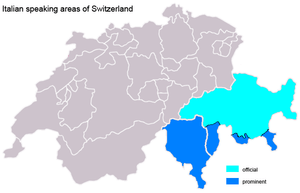Swiss Italian
| Swiss Italian | |
|---|---|
| svizzero italiano | |
| Native to | Switzerland |
Native speakers | 545,274 (2011 census)[1] |
|
Indo-European
| |
| Official status | |
Official language in |
|
| Language codes | |
| ISO 639-3 | – |
| Glottolog | None |
 | |
| Part of a series on the |
| Italian language |
|---|
|
| History |
| Literature and other |
| Grammar |
| Alphabet |
| Phonology |
Swiss Italian (Italian: svizzero italiano) is the name used for the variety of Italian spoken in the Italian-speaking area of Switzerland. Swiss Italian is spoken as natively by about 350,000 people in the canton of Ticino and in the southern part of Graubünden (Canton Grigioni). Swiss-Italian also refers to the Italian speaking population in this region (southern Switzerland) close to the border with Italy. Swiss Italian dialects are spoken in emigrant communities around the world, including in Australia.
Spoken in Ticino is also the Ticinese, a comprehensive name for the dialects of Western Lombard spoken in the same area of Switzerland.
Characteristics
Despite being like standard Italian, Italian spoken in the Italian speaking region of Switzerland presents some regional differences from the Italian spoken in other regions of Italy due to the presence of French and German from which it forms calques. An example would be the words for driving licence: in Italian it is called "patente di guida" while in Swiss Italian it becomes "Licenza di condurre", from the French "Permis de conduire". Another example is the interurban bus: In Italian it would be "autobus" or "corriera" while in Switzerland it is the Autopostale or posta (because nearly all interurban lines are run by a subsidiary of the Swiss Post).
Radiotelevisione Svizzera di lingua Italiana is the main Swiss public broadcasting network in Italian. The University of Lugano is the major university of Italian Switzerland.
Swiss Italians of Australia, (also Swiss / Italian and Swiss-Italian) are the Italian speaking Swiss and Italians that settled in Australia during the 1850s and 1860s. The Swiss Italians initially settled in the area around Daylesford in Victoria. The Swiss settlers were from the canton of Ticino and in the southern part of Graubünden. The Italian settlers were predominantly from the northern Italian Regions of Lombardy, Veneto, Emilia Romagna, Liguria and Piemonte.
Examples
Some examples of Ticinese words that are different from Italian are:
| Swiss Italian | Italian | English Translation | Notes |
|---|---|---|---|
| chifer | cornetto | croissant | from the German Gipfel |
| azione | promozione (offerta) | offer | from German Aktion |
| riservare | prenotare | to reserve | from the French réserver |
| comandare | ordinare | to command | from the French commander |
| medicamento | medicinale, farmaco | drug, medicinal product | from the French médicament |
| vignetta | bollino (o contrassegno) | tag (a label to exhibit, typically in a car) | from the French vignette |
As may be seen from this table, as well as the case with the driving licence described above, Swiss Italian has fewer false friends with English than standard Italian does, as calques from French in Swiss Italian match Latin-origin words in English more often than the original Italian words do.
See also
- Swiss German
- Swiss French
- Languages of Switzerland
- Swiss Italians of Australia
- Italian immigration to Switzerland
Notes and references
- ↑ "Bevölkerung, Strukturerhebung der eidgenössischen Volkszählung 2011: Bevölkerung nach Sprache und Religion, Ständige Wohnbevölkerung ab 15 Jahren nach zuhause gesprochenen Sprachen, 2011" (XLS). http://www.bfs.admin.ch'' (Statistics) (in German, French, and or Italian). Neuchâtel: Swiss Federal Statistical Office, 2013. 30 May 2013. Retrieved 22 December 2013.